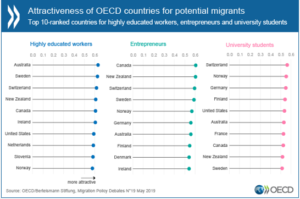Australia a magnet for skilled, educated migrants – OECD
 Australia has been rated the most attractive nation in the world for highly educated workers in a report released by the world’s leading economic research body earlier this week.
Australia has been rated the most attractive nation in the world for highly educated workers in a report released by the world’s leading economic research body earlier this week.
It also performed well in other areas of the Organisation for Economic Co-operation and Development (OECD)’s first report on its member nations’ attractiveness to talented migrants.
The report, however, also highlights some areas for improvement.
The OECD’s analysis applied base factors of attractiveness across the three categories of migrants in question, with Australia ranking first for highly qualified workers, sixth for university students and seventh for entrepreneurs.
These results demonstrate Australia’s positive performance against the report’s base factors for attractiveness, which include work opportunities, tax conditions, local attitudes of inclusiveness, quality of life and likelihood of acceptance.
More specifically, Australia’s perceived attractiveness to highly skilled workers (those at a masters/PHD level of attainment), is due to favourable labour conditions and excellent skills environments for such workers, although the US would be first for these reasons were it not for its stringent visa conditions, the OECD report said.
Joining Australia in the top five nations in this area are Sweden, Switzerland, New Zealand and Canada, while nations with exceptionally strict admission conditions (such as Israel, Japan and Turkey) or very slow processing times (Poland) suffered as a result, the report said.
In the area of foreign-born university students, the report highlights Australia’s tertiary spending and English-language curriculum as providing a positive skills environment for such students. It does, however, show room for improvement.
This was principally an issue of access, with Australia’s comparatively arduous student-visa process and higher academic requirements scoring negatively against the best-performing nations, such as Switzerland, Norway and Germany, the OECD report said.
Other factors crucial to this part of the analysis include the capacity to work allowed under student visa arrangements and the overall cost of tuition. Australia compares negatively in these areas in comparison to various European countries.
Finally, the report did not highlight Australia as rating either strongly or poorly for foreign entrepreneurs, with its seventh-place rating likely a reflection of its base level attractiveness and agreeable environment for such individuals, rather than any exceptional traits in the area.
Those nations above Australia exhibited high scores for ease of trade, trade openness and employment/product market regulation.
Those below were often positioned so for high investment requirements, with the US a key example of this as it requires a prospective investment to be of a minimum $1,000,000 and to create/preserve at least ten jobs in order to attribute a visa, the report said.
Even under the most favourable policy conditions possible, the report posits that Australia would still fall short of ideal attractiveness to entrepreneurs, probably due to the challenges presented to such individuals by its geographic location.
Outside of the rankings and their explanations, the OECD report carries a secondary aim in informing the impacts of increased talent mobility/competition on both origin and host nations.
It notes a vast increase in the international stock of tertiary-educated migrants over the last two decades, noting the increasing demand for educated workers implicit to rapid technological change as a leading factor.
It also understands the balance of positive to negative for origin nations as dictated by the brain gain it receives upon the return of its citizens from host nations, as opposed to the brain drain it suffers losing them in the first place.












